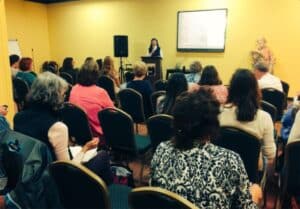As Catholics, we appreciate media and media technology and want to be an “active, listening presence” in the “new culture created by modern communications,” (Aetatis Novae #8, 11). This requires that we use media well, virtuously. In our society today, it is of paramount importance that we develop virtuous media habits in ourselves and help our young people do the same.
Some media tech leaders use media in a much more balanced and intentional way than the average user. For example, the founder Tumblr doesn’t allow screens in his master bedroom and the CEO of Bumble only checks email once in morning & afternoon when she’s taking time off with family & friends. It is also noted that most tech industry leaders won’t put pictures or information about their children online.
I’ve been presenting to parents and teens for years now about media, technology and faith, especially in relation to Saint John Paul II’s teaching on the theology of the body. I’ve compiled a list of “best practices” for media use in the family, the fruit, not only of my own reading, research, and reflection, but also of many conversations with parents and teens. The parents, especially, struggle with implementing good media rules in their families and desire clear suggestions for helping their kids develop media habits that will enable them to grow as persons and disciples.

–Don’t get Amazon’s Alexa (or any of her creepy relatives). We do not need one more electronic intruder disturbing family life. And eavesdropping. And gossiping about you with your refrigerator and stove. Don’t outsource your brain. Make your own grocery list. As a child of the Cold War, I’m appalled that we are bugging our own homes. And—God help us–do not let a robot raise your children. Or “help” you raise your children. You know what? It’s good for kids to be bored once in a while. And feel sad and not get everything they want when they want it and know how to fail at something.
–Unless there’s a real need, as a regular practice, keep all notifications off on smartphones, or keep in airplane mode. No one needs to be constantly available, constantly fragmented, constantly having our thoughts/words/activities interrupted. We also don’t need to be disrupting everyone in our vicinity with noise pollution: pinging, dinging, buzzing & beeping.
–For peace of mind and smooth personal and/or business interactions, let people know your media habits. Let them know the best and fastest way to reach you. Let them know when you’re not available. Stick to your personal policies. Expect that if you have been totally available 24/7 up till now, people will be upset and you’ll lose your reputation as the “on,” “it,” “lit,” “wired,” cool, snappy, spiffy, nifty media maven. That’s totally OK.

–If you can’t keep up with emails, put an “away” message on (even if you’re not “away”) explaining why you’re behind in emails and when you’ll be catching up. Same with voice message on your phone if needed.
–According to Sherry Turkle (MIT), it was when we went “untethered” from our desktop computers with internet on smartphones that human behaviour took a turn for the addicted worse. Try to use your smartphone only for calling/texting and a few other chosen tasks. If you do everything else on a laptop (for example, email, most social media), it will “tether” you again for certain tasks, and free you up to be engaged in real life, actual reality again, 95% of the time, rather than living mostly in a distracted, multi-tasking virtual reality.
–“Multi-tasking” doesn’t actually exist. The brain can really only do one thing at a time. With multi-tasking, our brain is simply “switching” back and forth as fast as it can. No matter if we’re young or old, whatever we do while “multi-tasking” is stored at a very superficial level in our brain and makes it difficult to remember, utilize well or make a synthesis of.
–You don’t have to wear earbuds/headphones whenever you’re by yourself (or with others) for hours per day. If you’re on a bus, walking somewhere, etc., be open to your surroundings, engage with others, listen to ambient sounds. Be a part of the scenery, a part of the universe. Be a “porous self” (open to the world: giving & receiving) not a “buffered self” (closed).
–All internet-enabled media devices (TV’s, phones, iPads, Xboxes, etc.) should have safety-company-installed filters on them (including adults’ devices!) Talk to your internet service provider and phone company about kid/teen restrictions. www.covenanteyes.com is the premiere filter that now has specific filters for social media as well.
–Require 2 hours of outdoor/active/creative play per day before any device time. One mom found that her kids get so involved in sports, outdoor play, hobbies, etc., that they forget about devices or have very little time left for them.

–You are NOT putting your young person at any disadvantage by getting them a simple flip phone at an appropriate age and delaying a smartphone. The technology is designed to be pathetically simple and repetitive. No skills are gained or exercised by constant smartphone use. Young people who get their first smartphone at 15 or 16 pick it up immediately. One young man got his first smartphone at 17 and by 18 was making big bucks creating apps for people.
–Phones and other media devices are not a “right,” but a privilege and a great responsibility for young people. Types of media, media devices and media usage need to be gradually meted out at different ages to youth, with corresponding guidelines and consequences if the guidelines are transgressed. The point is NOT that it’s “your” phone (the parent) because you’re paying for it (many young people make enough money at a certain point to pay for their own phones). The point is that our young people need to develop media skills (using media virtuously). If it’s just a matter of ownership and payment, no one is learning anything or gaining any skills or showing that they can be trusted step-by-step with such powerful technology. “Trust but verify.”
–Devices should all be charging in parents’ bedrooms (or better yet, the kitchen) overnight, all turned in to parents at a certain time and given back at a certain time the next day. No young person should have unlimited, unsupervised time with their media devices. The media device becomes an appendage, a buddy (the first “person” they see/touch before going to sleep and in the morning), an unlimited god/genie that can deliver their every wish.
–You must have a conversation about pornography, porn addiction, porn prevention, porn recovery with teens. I am meeting young women in their early 20’s who are addicted to porn and angry at their parents. They tell me: “I wish my parents were more vigilant about my media use. I started using porn at 10, 13, etc.” Book to read with kids: “Good Pictures, Bad Pictures: Porn-Proofing Today’s Kids.” For teens: www.FightTheNewDrug.com www.PornKillsLove.com Free for those under 18: www.fortifyprogram.org
–Don’t be afraid to parent. Accept the fact that you won’t be the cool parent. Accept the fact that you’ll be a parent first and a friend second. All the studies show that your kids/teens want you to parent. All the studies show that your kids/teens want to know what you think, what you value and why. They may rebel. They may push or cross the boundaries, but they desperately want those boundaries to be there because it means there really is right and wrong in life. They really want those boundaries because it means you love them. It means you care. It even gives them an excuse with their friends. They know it’s easier for you to NOT parent, to let them do whatever they want. They also know that’s not love. You must parent the media if you love your kids.
–Orthodontics, sports, nutrition, tutors, etc., are all important parts of parenting. But they are only for the here and now. Parents #1 job is parenting for hereafter. Getting your kids to heaven. Put “spiritual parenting” before “physical parenting.” Parents have no problem taking away a candy bar from the hands of a child before supper. A device can be a thousand times worse for them, but parents are strangely afraid to take a device away (or limit and guide a child’s use). Character building, teaching self-control and delayed gratification, the practice of virtue and altruism are for here and hereafter. Let yourself off the hook from having to be super-parent. Put “spiritual parenting” first, even if you have to let some “physical parenting” go. “Spiritual parenting” is more important…and lasting.
–You have no problem taking a candy bar away from a child before supper. When needed, you must take devices away. If they fly into a rage, that’s an indication that they’re addicted and you just took their heroin away. Your child has a serious problem. Get professional help.
–“You can’t always protect people. But you can make them strong.” –@jordanbpeterson
–Balance your media diet. Do media fasts. Discover the beauty of restraint, self-discipline, silence.
–We need certain areas that are designated TFZ’s (Tech Free Zones): in our homes, schools, churches, everywhere, so we can be human beings together. Define these zones for yourself and your kids.
–As Catholics, we are sacramental people. What is a Sacrament (one of the seven Sacraments)? “An outward sign instituted by Christ to give grace. A Sacrament accomplishes what it signifies.” What does that actually mean? “A Sacrament makes the invisible visible through a very clear symbol.” (For example, baptismal water really washes away original sin.) Creation and our human bodies are also sacramental. They are revelations of God to us. Our physical bodies are speaking a language to tell ourselves and others who we are, to reveal the spiritual, to tell us who God is, what our desires mean, what our design and destiny is. What is the opposite of sacramentality? Virtuality. We cannot choose to live our lives mostly in virtuality. BODIES ARE NOT OPTIONAL. For a list of the best books on Theology of the Body, click here.
–Some people ask if constant media tech use (and melding human biology with technology) is just the next phase of human evolution. No. Human nature is not evolving. It is what it is. Human beings are free to shape their own destiny. Human beings have always been capable of great good and great evil. We choose how we use media. Today’s media tech is quantitatively and qualitatively different from any media developments of the past. If used improperly or in excess, today’s media technology (and content) can majorly alter human biology and behaviour with a degree of permanence. Discern. “Test the spirits” (1 Thess. 5:21). Don’t lose your humanity. You only get one life. As Jaron Lanier, founding father of the field of virtual reality once said, “You are not a gadget.”
For more Media Literacy resources and Parenting the Media resources, click here.
For a list of helpful articles on media literacy, click here, and go to the end of the blog post.


